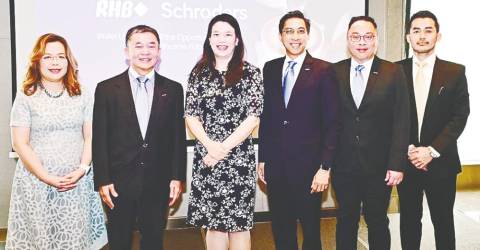ADVERTISE HERE
PETALING JAYA: The overlap between halal and environmental, social and governance (ESG) compliance provides a wider market for Malaysia to access, according to Sinisana Technologies Sdn Bhd co-founder and CTO Jonah Lau.
“There are so many things within the halal space that actually align with the global sustainability standards and that’s an amazing opportunity that Malaysia should capitalise on as a leader in the halal economy.
“If we can position our halal products to not just meet Muslim standards, but also ESG standards, then the market becomes a lot bigger because you’re not just talking about US$7 trillion (RM32.7 trillion), you’re talking about a few hundred trillion dollar market that our exports would be able to tap into,” he told SunBiz.
The Sarawak-based tech startup company utilises enterprise blockchain technology to pioneer more sustainable supply chains.
“One of the biggest global trends is that consumers want more visibility and are concerned on where their products are sourced from, how is it made, has it been ethically made? Has it been processed in a way that does not harm the environment?,” Lau said, adding that based on feedback, the growing ethical interest is not only limited to the T20 groups albeit B40 group have equally voiced their concerns.
“We see the global mega trend of the move towards more ethical consumerism. Yet there are about two thirds of global companies that are not able to monitor their respective supply chain on a continuous basis. Hence, they are unable to meet these consumer demands,” he shared.
Lau said Sinisana focuses on several pressing global issues such as the need for halal compliance, food security, ethical sourcing related to forced labour as well as the whole resource lifecycle tracking for the circular economy.
Currently, it has four key products on the market – Sinisana Intersect, Engage, Saraf and an unnamed product which he described as an ESG circular economy offering.
“Sinisana Intersect is a digital product passport platform which helps businesses provide end to end traceability to consumers. For example, our halal digital product passport allows a Muslim consumer to have full assurance.
“Say, with a piece of beef, they will know that the food is actually halal because it gets tracked all along the supply chain. Back to the original cow or cattle and we keep track of the yield. So even if a cow weighs 380kg but after the slaughtering process, it weighs 250kg, we are able to keep track of that along the supply chain itself,” said Lau.
Sinisana’s Engage is a forced labour monitoring platform as it is an issue in Malaysia and the country needs to comply with global requirements to stay competitive internationally.
“Malaysia has the second largest number of companies in the world that have been banned from the United States because of forced labour issues, with China being number one. Yet all the solutions that we’ve seen so far have been coming from the US. Our company wants to provide a local solution that focuses on creating a consensus between businesses and workers,” Lau said.
Sinisana’s third offering, Saraf, is an agrofood production traceability which collects data to help provide government, industry and agencies with detailed visibility on farming activities and production.
Lau shared that Sinisana is in talks with the government for a particular project but declined to disclose details before its launch.
On the unnamed offering, he said that recently, it has partnered exclusively with Origo Eco Sdn Bhd to develop the world’s first blockchain traceable logistics pallet technology.
“In the global logistics supply chain industry, there are about 600 million pallets floating around and the majority of them are wooden pallets that require us to cut down a lot of trees, raising the issue of deforestation,” he explained.
“With our technology, every single pallet is traceable so that any company that uses it is able to generate ESG reports which can be submitted as part of its decarbonisation or net zero goals on how it is actually meeting its commitment towards sustainability,” he said, adding that the information will be vital for all stakeholders.
Lau said the partnership on pallet tracebility is currently exclusive. However it is open to talk with interested parties on any other area or products involving circularity.









 English (US) ·
English (US) ·